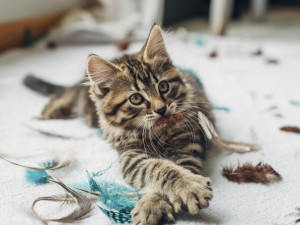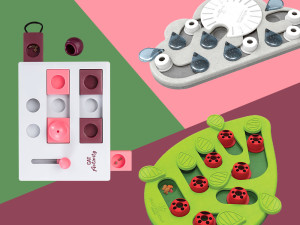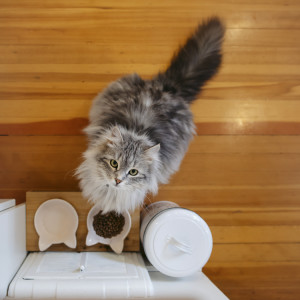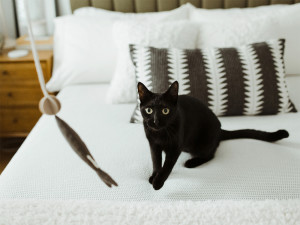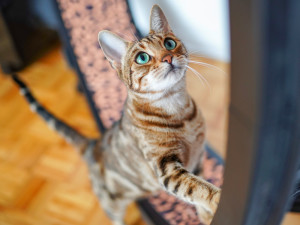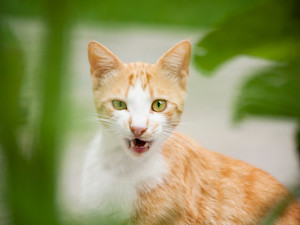Is It Full Goblin-Mode Behavior for Your Cat to Play with Their Food?
Nope, an animal behaviorist confirms it’s cool.
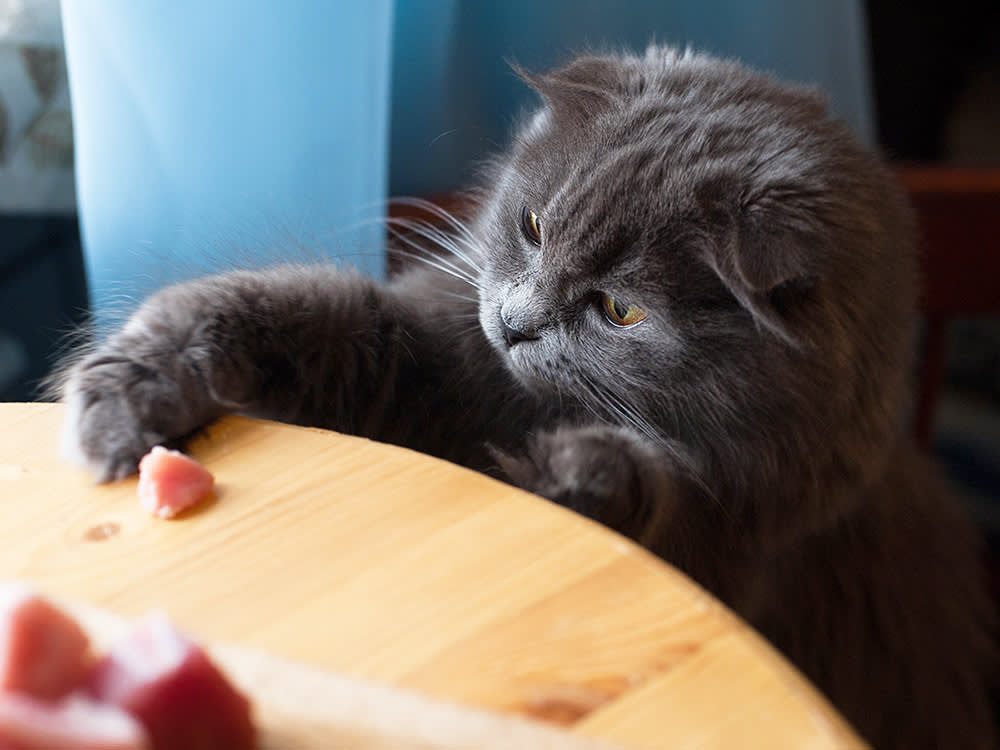
share article
In Disney’s The Lion King (1994) — hello, ’90s kids — the infamous villain, Scar, is upset about the idea that he will never be king of the Pride Lands (seems like someone needs to brush up on his Hamlet), and starts to play with his food,opens in a new tab a mouse, before consuming it. “Didn’t your mother ever tell you not to play with your food?,” Zazu, Simba’s avian caretaker, chastises as Scar dangles the mouse in front of his mouth.
Oh, cats.
Not every domesticated (non-lion) kitty has a watchful Zazu scolding them when they mess around with their kibble, but much to that rule-following bird’s likely disappointment, it’s fine for cats to play with their food. Here’s why.
It’s Fun
Sure, you may have to sweep ridiculously frequently or move the furniture more often than anyone would ever want to in order to collect lost pieces of food, but that’s the main down side. Otherwise, cats playing with their food offers a fun pastime for them, and a charming spectacle for us to watch. It’s a fair question, though, why cats play with their food at all.
Many cats simply find it fun to play with food. The pieces scatter about in an intriguing way, and it is easy for cats to bat them about and then follow them. Playing with their meal allows a lot of indoor cats to satisfy their hunting desires in the context of food, which is what cats have done for thousands upon thousands of years. Indoor cats are more inclined to play with their food than cats who live exclusively outside.
It’s not unusual for cats to find food more interesting than toys, even the adorable (and sometimes expensive!) toys that have been purchased specifically for their entertainment. Some cats begin to play with their food if they become bored by their toys. If they receive new toys or if someone makes the extra effort to play interactively with them, they happily ditch the food to play with toys. Other cats always prefer playing with their food over any toy that has ever been made available to them.
And Sometimes Spontaneous
Sometimes a cat will take up playing with their food out of the blue after years of treating food as just that—food. They may have suddenly realized that food offers playful opportunities and simply be enchanted with their new discovery. The novelty of a new plaything, even if it’s simply bits of food they have been exposed to for years, can be exciting. Many cats play enthusiastically with their food forever more, while others tire of it and move on to new options after a brief “food-is-fun!” phase.
There are owners who dislike seeing their cats trying to play soccer with little pieces of food or batting it about without eating it. The mess, the waste, and concerns over germs on pieces of kibble that have rolled out of sight can all be disconcerting. Puzzle bowls keep many cats interested in treating the food as food because it’s harder to get, and sometimes that cuts down on food play. Wetting the food can also stop the play because damp kibble doesn’t scurry across the floor, so it’s less fun for the cat to stalk, chase and pounce on it. Of course, if this type of fun is removed from your cat’s life, it’s important to add in fun in another way, whether that’s with toys, training, catios, muffin-tin puzzles, or any other type of enrichment.
There’s no harm in trying to engage cats in other types of playful behavior, but there’s nothing wrong with letting them play with their food, either. If it doesn’t bother you, then it's fine to let your cats amuse themselves in this way. Cats who are able to entertain themselves without messing with or destroying any items that don’t belong to them deserve a special place in our hearts.

Karen B. London, PhD, CAAB, CPDT-KA
Karen B. London, Ph.D., is a Certified Applied Animal Behaviorist and Certified Professional Dog Trainer who specializes in working with dogs with serious behavioral issues, including aggression, and has also trained other animals including cats, birds, snakes, and insects. She writes the animal column for the Arizona Daily Sun and is an Adjunct Professor in the Department of Biological Sciences at Northern Arizona University. She is the author of six books about training and behavior, including her most recent, Treat Everyone Like a Dog: How a Dog Trainer’s World View Can Improve Your Lifeopens in a new tab.
Related articles
![A fluffy cat looking up next to a food dish.]() opens in a new tab
opens in a new tab“Freeloading” Cats Won’t Work for Food
Cats prefer to be served, study says.
![Black cat staring at a cat toy]() opens in a new tab
opens in a new tabHow to Play With Your Cat
Cat behaviorist Cristin Tamburo’s got a game plan.
![Bengal cat running on indoor wheel]() opens in a new tab
opens in a new tab11 High-Tech Toys Your Cat Will Go Wild For
Stoke your little lion’s hunting instinct with these electronic cat toys.
![A cat outside showing its bottom teeth.]() opens in a new tab
opens in a new tabWhat’s All the Cat Chatter About?
Scientists believe they could be mimicking the calls of their prey.
